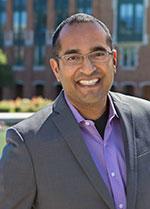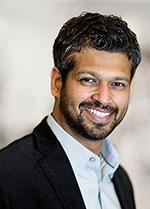Why Science Still Matters In A Data-Driven Age

Image credits: Mclek via Shutterstock
Inside Science Minds presents an ongoing series of guest columnists and personal perspectives presented by scientists, engineers, mathematicians, and others in the science community showcasing some of the most interesting ideas in science today. The opinions contained in this piece are those of the authors and do not necessarily reflect those of Inside Science nor the American Institute of Physics and its Member Societies.
(Inside Science Minds) -- We recently met with a host of biotechnology leaders and were struck by their infatuation with Big Data and machine learning. In fact, upon reflection, it was amazing how often the word "algorithm" came up in the course of our conversations with these accomplished scientists.
Don't get us wrong. The boom in software and computing has achieved powerful and profound results in our society. And, yes, the world is a better place, thanks to data analytics.
But we need to slow down and regain our perspective, because Big Data and machine learning are absolutely not ends unto themselves, and they certainly aren't a replacement for basic scientific research and exploration.
Part of the issue is that Big Data and machine learning make scientific problem-solving look easy -- and, sometimes, even magical. This appeals to our need for instant gratification in an impatient world that, too often, seems to view apps, rather than test tubes, as the smoothest and best way to achieve progress.
But this is a misconception that distorts our expectations and allows people to draw conclusions that aren't supported by evidence. Even worse, the current love affair with Big Data and machine learning, which simply identifies patterns, propagates a false perception that scientific rigor isn't really required and human knowledge isn't really relevant.
So, if there are any doubts, we want to say it loud and say it proud -- science is (and must remain) alive and well. The hard, laborious and painstaking work in the lab has to continue so that we can understand how nature operates; so that we can discover and expand into new knowledge areas; so that we can keep asking "Why" during the scientific inquiry and experimentation process; and so that we can build new systems models that are needed to address and confront some of the most critical issues that people on just about every continent currently face.
The career implications here are quite evident. It's much easier to gain access to a computer, generate large amounts of data and then build an algorithm as opposed to hunkering down in the lab over an extended period of time, asking probing questions, developing hypotheses and testing those suppositions.
It could also be argued that the appeal and attraction of Big Data and machine learning has engendered complacency. Sure, algorithms generate lots of quick hits; but we have to ask about the depth and richness of these insights, and whether the flood of patterns they're based on actually obstructs our underlying knowledge. Put another way, Big Data and machine learning offer up correlations and matches while science tries to deal in causality and mechanistic underpinnings.
We're not arguing in either/or terms. Indeed, in a more perfect world, we'd see a greater blend and balance between Big Data, machine learning and science. That means taking patterns and hypotheses about cause and effect and designing thoughtful, statistically powered, and fully dimensional experiments that test for the natural truth.
Part of the solution here is cross-disciplinary training, so that data experts can better understand scientists and vice versa. And, in terms of curriculum, we also need a co-mingling of disciplines in order to achieve the best knowledge outcomes.
The key question is what happens if we don't find the right blend and balance between Big Data, machine learning and solid scientific study and discovery. First, we'll probably see a growing number of talented but frustrated scientists, which doesn't bode well for our innovative future; we could see funding for basic science soften; for its part, Big Data will miss out on a chance to play a truly meaningful role in society's problem-solving process; and, perhaps most importantly, the hard science of building and breaking things in the name of knowledge and well-being will be significantly diminished.
The bottom line is that we can't afford to let Big Data and machine learning eclipse science; and, on the other side of the fence, science can’t afford to shun Big Data and machine learning if it wants to continue solving the toughest problems for this generation and the ones that will follow.
At the end of the day, we need to keep in mind that some of these problems are so intricate and tangled that we'll need healthy doses of both observation and evidence in order to unravel them. We must also remember that correlation does not imply causality, and causality is necessary to get at mechanistic underpinnings of a problem upon which solutions can be built. And, finally, let's not lose sight of the fact that machine learning finds patterns and looks at the "what." But it does not examine the "why," which represents critical knowledge in an age of growing complexity and confusion.
 Vikram Jandhyala is Vice President for Innovation Strategy at the University of Washington. He is Executive Director of CoMotion, UW's collaborative innovation hub, and the UW co-CEO of the Global Innovation Exchange (GIX). He is a Professor and former Chair in the Department of Electrical Engineering, and an Adjunct Professor in the Information School.
Vikram Jandhyala is Vice President for Innovation Strategy at the University of Washington. He is Executive Director of CoMotion, UW's collaborative innovation hub, and the UW co-CEO of the Global Innovation Exchange (GIX). He is a Professor and former Chair in the Department of Electrical Engineering, and an Adjunct Professor in the Information School.
 Nitin Baliga is the Senior Vice President and Director at the Institute for Systems Biology, where he is a founding faculty member. His group utilizes systems biology to study complex biological phenomena related to evolution, climate change, biotechnology and medicine. He tweets at @ISBNitinBaliga.
Nitin Baliga is the Senior Vice President and Director at the Institute for Systems Biology, where he is a founding faculty member. His group utilizes systems biology to study complex biological phenomena related to evolution, climate change, biotechnology and medicine. He tweets at @ISBNitinBaliga.
